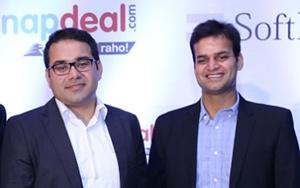Snapdeal, Flipkart call off merger deal
01 Aug 2017
Snapdeal, which had only last week decided to merge with bigger rival Flipkart under a $950-million deal, has now abandoned the deal and instead decided to go it alone after independent shareholders of the e-commerce firm opposed the merger.

The company will now pursue an ''independent path'' and terminate all strategic discussions, a Snapdeal spokesperson said.
''Snapdeal has been exploring strategic options over the last several months. The company has now decided to pursue an independent path and is terminating all strategic discussions as a result,'' Snapdeal spokesperson said in an emailed statement, without naming Flipkart.
Snapdeal, which has been looking at all strategic options to remain in operation, said it has now a ''new and compelling direction - Snapdeal 2.0'' and has made significant progress towards the ability to execute this by achieving a gross profit this month.
''In addition, with the sale of certain non-core assets, Snapdeal is expected to be financially self-sustainable,'' it added.
The alternate plan, called Snapdeal 2.0, is likely to see Snapdeal emerge leaner, operating a platform connecting buyers and sellers, sans additional services such as logistics.
Founders Kunal Bahl and Rohit Bansal have gone back to the drawing board to chart out a revival of sorts for Snapdeal that may see a majority of the workforce being laid off. The company currently employs around 1,200 people, of which nearly 1,000 may be dropped, say sources.
In an email to employees, Bahl and Bansal are reported to have noted that the deal with Flipkart is ''incredibly complex to execute.''
Under the Snapdeal 2.0 plan, they expect that the business can be run on the proceeds of FreeCharge sale and expects a Rs150 crore profit from Snapdeal in the next one year. Gross profit is revenue minus cost of goods sold and does not take into account fixed costs such as employee salaries, rent, advertising etc.
''With the ongoing streamlining of costs and sale of some of our assets, such as FreeCharge, we are financially self sufficient as a company and don't need to raise additional capital to reach profitability. Needless to say, we will need to keep a tight control on our costs and work towards becoming a hyper efficient culture delivering profitable growth, month on month,'' Forbes quoted the founders as writing in the email.
The proceeds of FreeCharge sale, which is expected to be around Rs3,800 crore will help the company meet its current expenses and a leaner Snapdeal will then recharge operations.
Snapdeal was put on the block by SoftBank, its largest shareholder with about 33 per cent stake, about five months ago. A no-sale would help revive the company enabling SoftBank to reclaim over$1 billion it had written off.



















